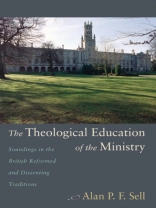Unwilling on conscientious grounds to submit to the religious tests imposed by the Universities of Oxford and Cambridge, the English and Welsh Dissenters of the second half of the seventeenth century established academies in which their young men, many of them destined for the ministry, might receive a higher education. From the eighteenth century onwards, theological colleges devoted exclusively to ministerial education were founded, while in Scotland historically, and in England and Wales over the past 120 years, freestanding university faculties of divinity/theology have provided theological education to ordinands and others.
These diverse educational contexts are all represented in this collection of papers, but the focus is upon those who taught in them: Caleb Ashworth (Daventry Academy); John Oman (Westminster [Presbyterian] College Cambridge); N. H. G. Robinson (University of St. Andrews); Geoffrey F. Nuttall (New [Congregational] College, London); T. W. Manson (University of Manchester); Owen Evans (University of Manchester and Hartley Victoria Methodist College)–the lone Methodist scholar discussed here; and W. Gordon Robinson and J. H. Eric Hull (University of Manchester and Lancashire Independent College). Between them these scholars covered the core disciplines of theological education: biblical studies, ecclesiastical history, philosophy, doctrine, and systematic theology.
Giới thiệu về tác giả
Alan P. F. Sell, of the University of Wales Trinity Saint David and the University of Chester, is a philosopher-theologian and ecumenist with strong interests in the history of Christian thought in general, and of the Reformed and Dissenting traditions in particular. A minister of The United Reformed Church, he has held rural and urban pastorates, has served from Geneva as Theological Secretary of the World Alliance (now Communion) of Reformed Churches, and has held academic posts in England, Canada, and Wales. He has earned the rarely-awarded senior doctorates, DD and DLitt, is a Fellow of the Society of Antiquaries of London and of the Royal Historical Society, and holds honorary doctorates from the USA, Hungary, Canada, and Romania. He is the author of more than thirty books, and the editor of others. Ever seeking to hold together what belongs together, he explores the relations between philosophy, theology and apologetics, Christian ethics and moral philosophy, and doctrine in relation to spirituality and the ecumenical quest.







![Bìa của Brian Schrag & Julisa Rowe: Community Arts for God's Purposes [Chinese] 貼近神心意的社群藝術 Bìa của Brian Schrag & Julisa Rowe: Community Arts for God's Purposes [Chinese] 貼近神心意的社群藝術](https://static.worldofdigitals.com/thumb_webp/740/9781645083740.webp)




